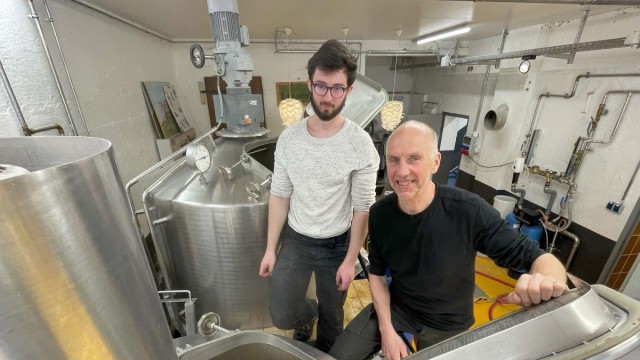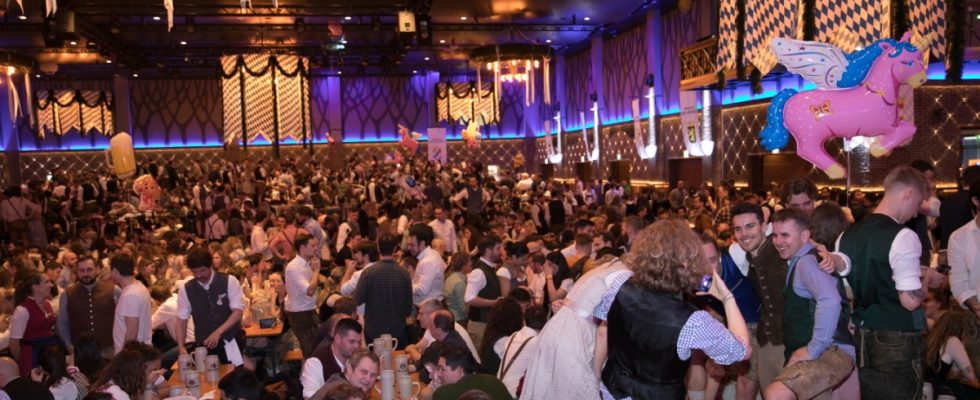The monks once discovered that not only can you get through Lent well if you sort beaver meat with the fish, but that high-proof strong beer also helps. The Munich innkeepers have refined their invention for the mass audience in such a way that a kind of indoor Oktoberfest can be established as an event between Ash Wednesday and Easter, which profitably accentuates the restaurateurs’ year before and after the Oktoberfest. Strong beer festivals are a big hit – and the young audience is obviously grateful that lederhosen and dirndls can now be worn again early in the year.
Of course, the Paulaner at Nockherberg is the top dog in Munich when it comes to strong beer. The politician derblecken on Bavarian Television (BR) has millions of TV fans and appeals to a mixed, if not predominantly older, audience. But as soon as the BR expanded its stage, the youth stormed the Nockherberg.
Landlord Christian Schottenhamel says that the Salvator, with its 7.9 percent alcohol by volume and 18.3 degrees of original gravity (14 euros per measure), but above all the exuberant, peaceful festive atmosphere, primarily attracts young people between 18 and 30. They almost exclusively come in traditional costume. The “cliché of the pot-bellied, gruff, heavy drinker” has long since been replaced “by young people who are beginning to notice how good strong beer tastes,” says Schottenhamel. This excites him because it promises a good future for him and his industry.
Landlord Christian Schottenhamel has enormous respect for the effect of strong beer.
(Photo: Florian Peljak)
The innkeeper’s top dog notices this in his strong beer record: 60,000 liters of Salvator strong beer flow into the mugs, plus 62,000 liters of light beer, 2,900 liters of non-alcoholic beer, 5,000 liters of Jägermeister, plus another 15,000 liters of other things, soda, for example, mixed with strong beer “Monkey” is the name. Schottenhamel himself has enormous respect for the effect of strong beer: “One beer soon has as much alcohol as a bottle of wine.”
But his customers also have respect; on average, they drink no more than one pint of strong beer, switch to less strong drinks and coat their stomachs well as a preventive measure: 6,000 chicken, 4,500 roast pork and 3,800 portions of Kässpatzen are part of the balance of his strong beer festival weeks.
The “Valentinator” is a homage to Karl Valentin
The fact that strong beer happiness is also possible on a smaller scale can be admired in Munich-Perlach in an institution that calls itself “The Research”. Founded in 1930 by the brewing technology engineer Gottfried Jakob, who developed 50 brewing patents, and expanded by him in 1938 to include a Bräustüberl, which he called the “testing center”, it has been diligently testing what brewing beer can produce ever since: Jakob counted on the opinion of the paying customers his experiments. The microbrewery had been orphaned since 2018, but in 2021 brewing engineer Werner Schuegraf from Haidhausen moved his creative brewery Hopfenhäcker into the “research” and not only revitalized the rooms, but also Gottfried Jakob’s idea.
This puts Bräustüberl owner Michael Achhammer in the fortunate position of being able to offer two strong beers, a third-party brewed dark Doppelbock “Jakobator” (7.9 percent alcohol by volume, 18.5 degrees original gravity) and the research-brewed “Valentinator” (8 ,3; 18,5), which is reminiscent of Karl Valentin, because the hop choppers began their trade at Weißenburger Straße 28, where Karl Valentin once gave up his carpentry apprenticeship. Valentin’s descendants have agreed, and Werner Schuegraf’s brewing trainee, who helps with the two 1000 liter brew kettles, is appropriately named Valentin Schartner.
On Friday evening, “Die Münchner Spitzbuben” will perform at the Starkbierfest finale, a trio that plays folk and light music for Achhammer’s regular audience – free of charge. “That’s part of it,” says the innkeeper. Unlike the Nockherberg, it has 200 seats of all age groups, both traditional and civilian, including twelve students from the Bundeswehr University in Neubiberg. Big strong beer advantage for them: “We can walk home,” says student Daniel. He is, so to speak, an expert in terms of origin because he comes from near Einbeck in Lower Saxony, where the particularly long-lasting and transportable bock beer was invented: “Ainpökisches Bier”, bock beer, hence the name.

Everything here is still handcrafted: Brewing engineer Werner Schuegraf (right) and trainee Valentin Schartner stand at the brewing kettle at the Perlach research brewery.
(Photo: Tom Soyer)
Schuegraf produces 900 liters of beer with one brew. Unlike the big Munich competition, everything is still done by hand. But he also knows about the proportions: “What I brew in a whole year, Paulaner does with a single brew.” Anyone who likes smooth, velvety dark, cold-hopped, malty strong beer can still make a note of “The Research” for the next Lent, because the big arenas only work with online reservations with months of lead time. The big innkeepers open the strong beer reservations soon after the Oktoberfest, and everything was reserved for the Nockherberg at the end of November, and for the Löwenbräukeller and the Augustinerkeller a little later.
With the exception of “research,” strong beer festivals are now a party event. In the old brick warehouse cellars beneath the Augustiner beer garden on Arnulfstrasse, 350 young people in traditional costume dance into the night. You don’t hear anything about it at the top of the bar, but if you follow the small spiral staircase into the cellar, you end up where the Maximator is being poured from 100 liter wooden barrels and the “Harthauser Musi” is shouting and exuberantly singing the hit “YMCA” with the crowd , the mood is great.
“The waitresses are through.”
Managing director Darko Stanić smiles very happily, but is also happy for the 200 employees from 40 nations in his Augustiner cellar that things will soon be starting in the beer garden (6,500 seats). Still, the year won’t be quiet, he says: “EM, the Adele concerts, the Oktoberfest, the Christmas parties, many trade fairs in winter – and then strong beer time again.” The Munich beer event calendar is filling up.
That’s exhausting too. “The waitresses are through,” says a manager, and Thomas Wohlschläger, “Die Kirchdorfer” bandleader, is now hoarse on the Nockherberg stage from his 23 appearances there. He and his professional colleagues tour the world all year round and live from what he calls the “globalization of Oktoberfest.” They have already been to Chile this year, Dubai, Tanzania, Namibia and India are still to come. Everything “Oktoberfest”.
But the mood carries him, he warms up the 2,700 guests at the Nockherberg with the “Bobfahrerlied”, Taylor Swift and Italo hits. And it gives the strong beer, which is now used quite secularly, something of a beer-ecumenical touch: it plays during the strong beer season in the Paulaner Wirtssaal with Christian Schottenhamel, who is the Spaten-Fest host at the Oktoberfest, and is, above all, borrowed from the Hacker-Fest host Thomas Roiderer, because “Die Kirchdorfer” play there at the Oktoberfest.
At 7 p.m. sharp on Saturday, Anita Richtmann from Oberpframmern taps a 50-liter barrel of Triumphator (7.6 percent, 18.2 degrees) in the Löwenbräukeller on Stiglmaierplatz in front of 1,800 cheering guests. The young woman who serves in the Löwenbräu tent at the Oktoberfest only needs two and a half strokes. Landlord Ludwig Reinbold (who runs the Wiesn-Schützen-Festzelt with his family) is also cheering. Next year he will add Wednesday to the strong beer festival (Thursdays, Fridays, Saturdays) in the Löwenbräukeller. Lent in Munich is thirsty for partying.

